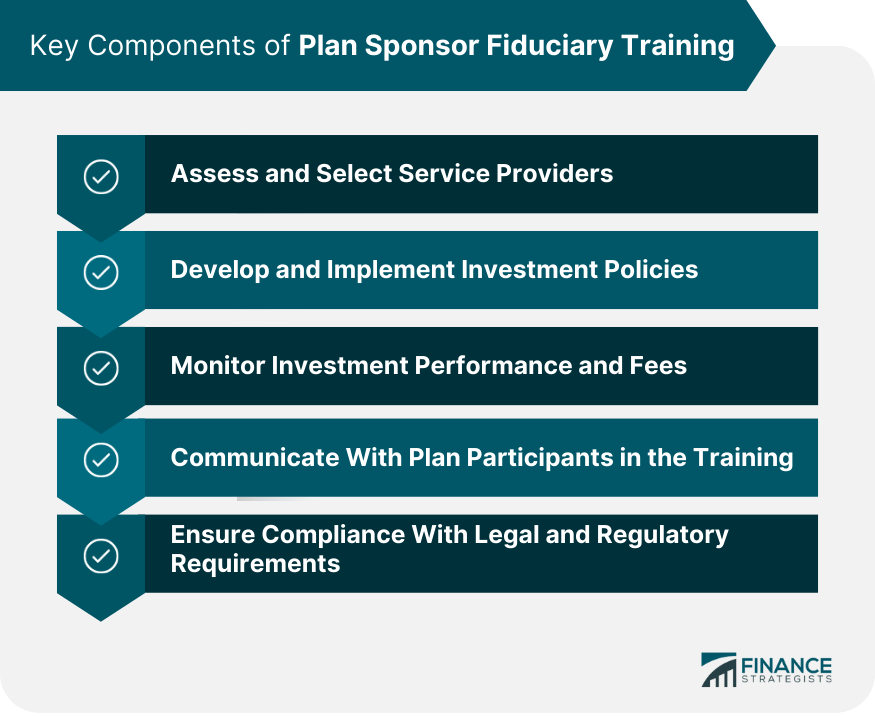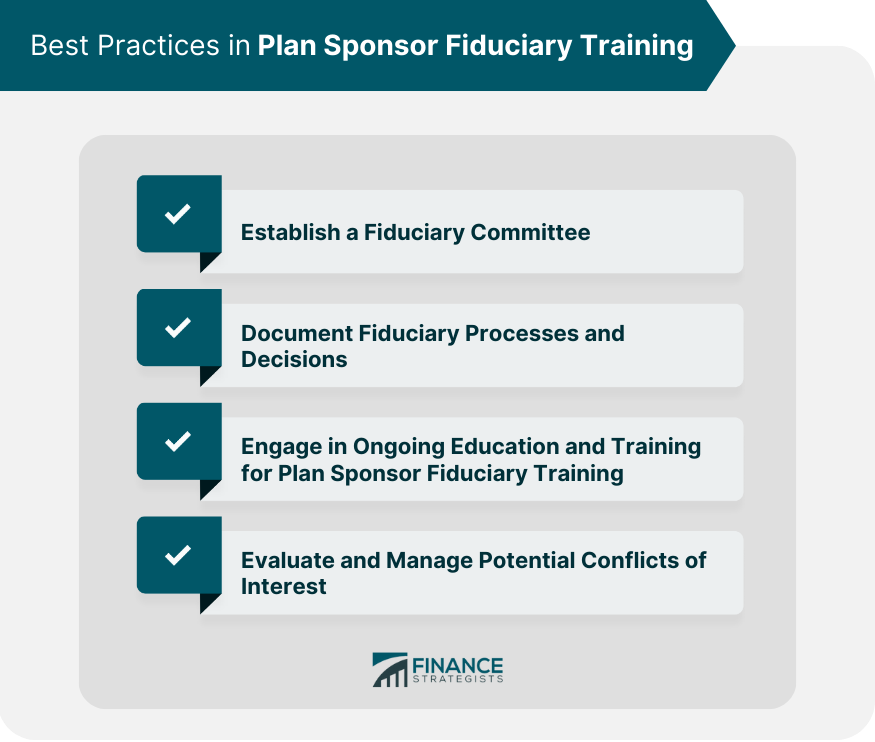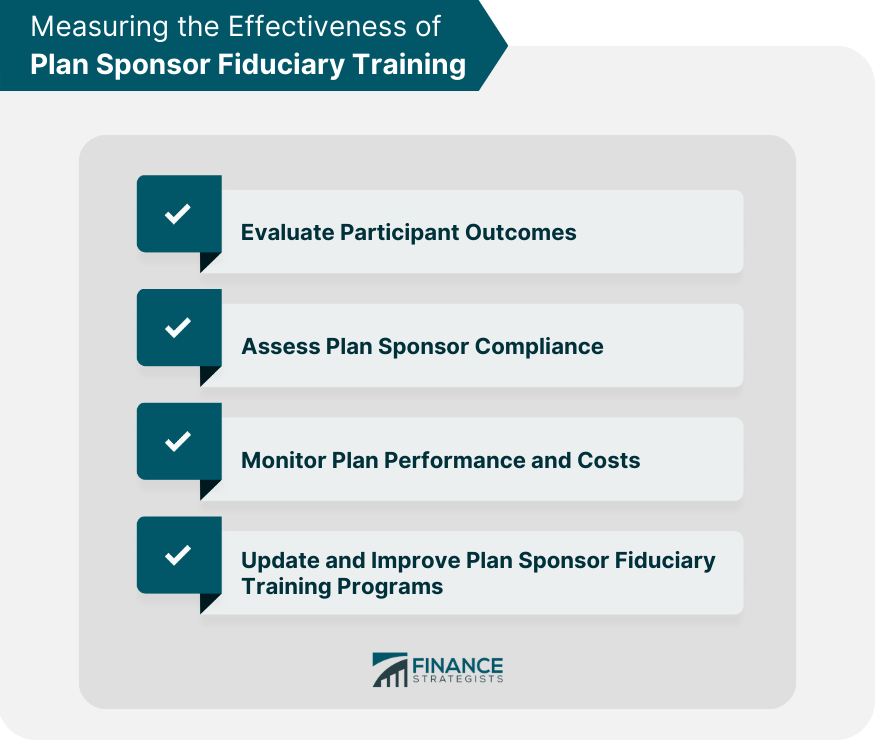Plan sponsor fiduciary training is an educational program designed to help plan sponsors understand and fulfill their fiduciary responsibilities when managing retirement plans, such as 401(k) plans. The training aims to equip plan sponsors with the knowledge and tools needed to navigate complex regulations, make informed decisions in the best interests of plan participants, and minimize legal and financial risks associated with retirement plan management. A plan sponsor fiduciary is an individual or entity responsible for managing a retirement plan, such as a 401(k), on behalf of plan participants and beneficiaries. This role includes making decisions related to plan investments, administration, and overall management to ensure the best interests of participants are met. The main goals of plan sponsor fiduciary training are to educate plan sponsors on their fiduciary responsibilities, help them understand the regulatory environment, and equip them with the tools needed to make sound decisions for the benefit of plan participants. This training also helps plan sponsors minimize the risk of costly litigation and regulatory penalties. The Employee Retirement Income Security Act (ERISA) is a federal law that establishes fiduciary standards for plan sponsors managing retirement plans. ERISA requires plan sponsors to act in the best interests of plan participants and beneficiaries and adhere to specific fiduciary duties to ensure that their retirement plans are managed prudently and in accordance with plan documents. The duty of loyalty requires plan sponsors to act solely in the interest of plan participants and beneficiaries when making decisions related to the retirement plan. This means prioritizing the financial well-being of participants over any other interests, including those of the plan sponsor or other parties. Plan sponsors must exercise the duty of prudence by making decisions with the care, skill, and diligence that a prudent person would under similar circumstances. This includes conducting thorough research, seeking professional advice when necessary, and continuously monitoring plan performance and investments. To reduce the risk of large losses in a retirement plan, plan sponsors have a duty to diversify plan investments. This means spreading investments across a range of asset classes, industries, and geographic regions to minimize the impact of poor performance in any single investment or sector. Plan sponsors must follow the terms of the plan documents, which outline the rules, procedures, and guidelines for managing the retirement plan. Failure to adhere to plan documents can result in legal and financial consequences, including penalties, fines, and potential litigation. Failing to meet fiduciary responsibilities can have significant consequences for plan sponsors, including personal liability for losses incurred by the plan, civil penalties, and potential criminal liability. Additionally, the Department of Labor and other regulatory agencies may take enforcement actions, resulting in further penalties and fines. One critical component of fiduciary training is learning how to assess and select service providers, such as investment managers, recordkeepers, and consultants. Plan sponsors must carefully evaluate the qualifications, fees, and performance of potential providers to ensure they align with the best interests of plan participants. Plan sponsors must develop and implement sound investment policies to guide the management of retirement plan assets. Fiduciary training helps plan sponsors create investment policies that reflect the goals and risk tolerance of plan participants while adhering to investment policies. Plan sponsors must regularly monitor investment performance and fees to ensure that plan assets are managed effectively and that participants are not paying excessive fees for services. Fiduciary training teaches plan sponsors how to analyze investment performance, and benchmark fees, and take corrective actions when necessary to maintain the best interests of plan participants. Effective communication with plan participants is a critical component of the plan sponsor fiduciary responsibilities. Fiduciary training helps plan sponsors develop strategies for clearly and accurately conveying important plan information, such as investment options, fees, and performance, as well as any changes to the plan that may affect participants. Plan sponsors must ensure their retirement plans comply with all applicable legal and regulatory requirements, including ERISA, the Internal Revenue Code, and other federal and state regulations. Fiduciary training educates plan sponsors on these requirements and provides guidance on implementing processes and procedures to maintain compliance. Creating a fiduciary committee comprised of individuals with diverse expertise and backgrounds can help plan sponsors make informed decisions and share fiduciary responsibilities. This committee can provide valuable insight, oversight, and accountability, leading to better management of the retirement plan. Plan sponsors should document all fiduciary processes and decisions to demonstrate compliance with their fiduciary responsibilities and reduce potential liability. Proper documentation includes records of meetings, research, and analysis, as well as any actions taken in response to issues or concerns. Fiduciary responsibilities and the regulatory environment are continually evolving, making ongoing education and training essential for plan sponsors. Staying up-to-date with industry trends, regulatory changes, and best practices ensures that plan sponsors can effectively manage their retirement plans and maintain compliance. Plan sponsors must identify and manage potential conflicts of interest that could compromise their fiduciary duties. Fiduciary training provides guidance on recognizing conflicts and implementing strategies to mitigate their impact on plan participants and beneficiaries. Measuring the effectiveness of plan sponsor fiduciary training includes evaluating participant outcomes, such as investment returns, fees, and overall satisfaction with the plan. Positive participant outcomes indicate that plan sponsors are effectively managing their fiduciary responsibilities. Audits, reviews, and self-assessments can help plan sponsors evaluate their compliance with fiduciary responsibilities and regulatory requirements. Regularly assessing compliance helps plan sponsors identify and address potential issues, ensuring the continued effectiveness of their fiduciary training programs. Monitoring plan performance and costs is crucial for measuring the effectiveness of fiduciary training. Plan sponsors should continually review investment returns, fees, and overall plan expenses to ensure they are aligned with industry benchmarks and in the best interests of plan participants. Plan sponsors should regularly review and update their fiduciary training programs to reflect changes in regulations, industry best practices, and participant needs. Continuously improving training programs helps plan sponsors maintain their expertise and provide optimal retirement plan management for plan participants. Plan sponsor fiduciary training is an education program to help manage retirement plans, like 401(k)s, by fulfilling fiduciary responsibilities. It provides knowledge and tools to make informed decisions, minimize legal and financial risks, and navigate complex regulations. Plan sponsor fiduciary training is essential for protecting plan participants and beneficiaries by ensuring their retirement plan assets are managed effectively and in their best interests. Well-trained plan sponsors can make informed decisions that promote the financial well-being of plan participants. Minimizing these risks reduces potential liability and helps protect plan sponsors from costly litigation and penalties. A well-managed and compliant retirement plan is the result of a comprehensive and effective plan sponsor fiduciary training program. By investing in fiduciary training, plan sponsors can ensure they are fulfilling their responsibilities and providing the best possible retirement plan management for their plan participants.What Is Plan Sponsor Fiduciary Training?
Understanding Fiduciary Responsibilities in Fiduciary Training
ERISA and Plan Sponsor Fiduciary Obligations
Key Fiduciary Duties of Plan Sponsors
Duty of Loyalty
Duty of Prudence
Duty to Diversify Investments
Duty to Follow Plan Documents
Potential Consequences of Failing Fiduciary Responsibilities
Key Components of Plan Sponsor Fiduciary Training

Assessing and Selecting Service Providers
Developing and Implementing Investment Policies
Monitoring Investment Performance and Fees
Communicating with Plan Participants in Plan Sponsor Fiduciary Training
Ensuring Compliance with Legal and Regulatory Requirements
Best Practices in Plan Sponsor Fiduciary Training

Establishing a Fiduciary Committee
Documenting Fiduciary Processes and Decisions
Engaging in Ongoing Education and Training for Plan Sponsor Fiduciary Training
Evaluating and Managing Potential Conflicts of Interest
Measuring the Effectiveness of Plan Sponsor Fiduciary Training

Evaluating Participant Outcomes
Assessing Plan Sponsor Compliance
Monitoring Plan Performance and Costs
Updating and Improving Plan Sponsor Fiduciary Training Programs
Final Thoughts
Plan Sponsor Fiduciary Training FAQs
The primary goal of plan sponsor fiduciary training is to educate plan sponsors on their fiduciary responsibilities, help them understand the regulatory environment, and equip them with the tools needed to make sound decisions for the benefit of plan participants while minimizing the risk of costly litigation and regulatory penalties.
Plan sponsor fiduciary training provides guidance on key fiduciary duties, such as the duty of loyalty, the duty of prudence, the duty to diversify investments, and duty to follow plan documents. By understanding these duties, plan sponsors can make informed decisions and ensure they are acting in the best interests of plan participants.
Some best practices in plan sponsor fiduciary training include establishing a fiduciary committee, documenting fiduciary processes and decisions, engaging in ongoing education and training, and evaluating and managing potential conflicts of interest. These practices help plan sponsors effectively manage their retirement plans and maintain compliance with fiduciary responsibilities.
While plan sponsor fiduciary training is not required by law, it is strongly recommended to ensure compliance with fiduciary responsibilities and minimize the risk of costly litigation and regulatory penalties. Some industries, such as financial services, may have specific training requirements or certifications for plan sponsors.
Plan sponsor fiduciary training is primarily designed for plan sponsors, such as business owners, executives, HR managers, and benefits administrators, who are responsible for managing retirement plans. However, other stakeholders, such as plan participants, financial advisors, and legal professionals, may also benefit from the training.
True Tamplin is a published author, public speaker, CEO of UpDigital, and founder of Finance Strategists.
True is a Certified Educator in Personal Finance (CEPF®), author of The Handy Financial Ratios Guide, a member of the Society for Advancing Business Editing and Writing, contributes to his financial education site, Finance Strategists, and has spoken to various financial communities such as the CFA Institute, as well as university students like his Alma mater, Biola University, where he received a bachelor of science in business and data analytics.
To learn more about True, visit his personal website or view his author profiles on Amazon, Nasdaq and Forbes.











